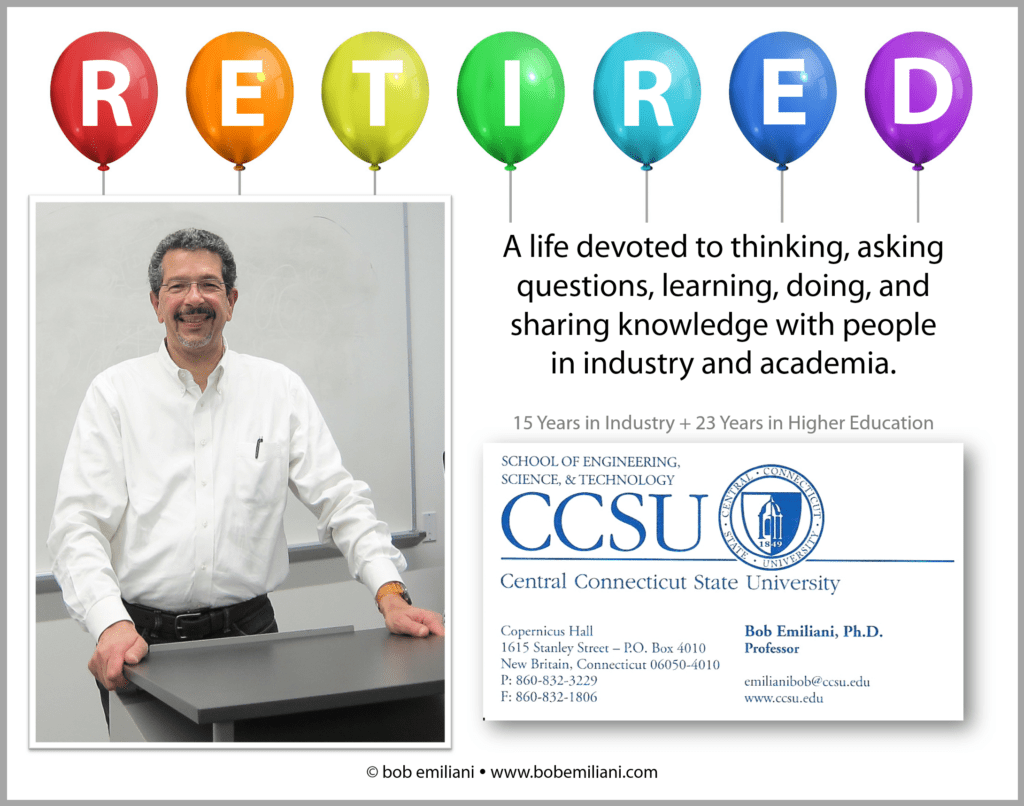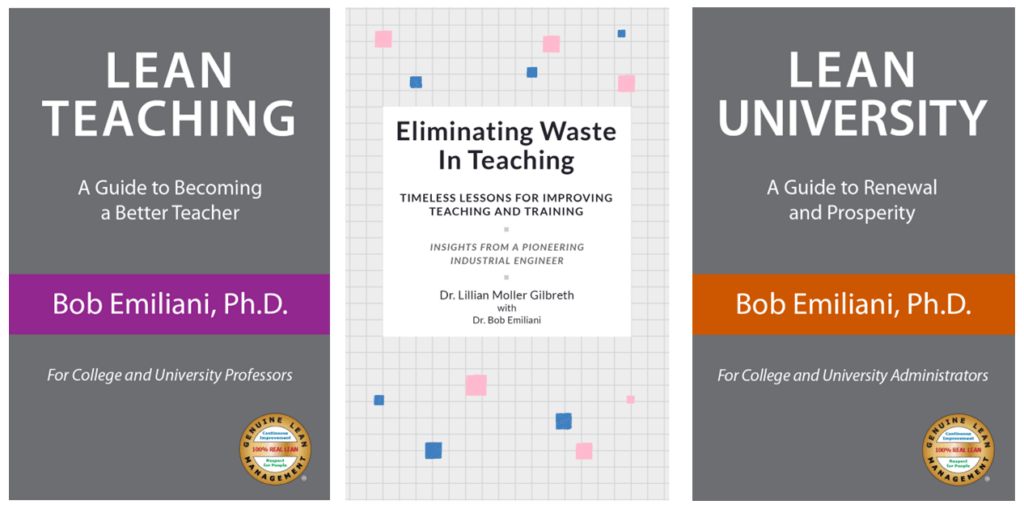After spending 15 years in consumer products (engineer) and aerospace (engineer and manager roles), I again changed industries in 1999 and joined higher education. By 2010 I was promoted to tenured full professor and awarded the emeritus professor title soon after my retirement in May 2022. What did I learn in those 23 years of teaching?

Having many years of real-world experience prior to working in higher education was critically important. This, however, is abnormal. Most universities leaders vastly prefer hiring faculty that have only academic experience and zero industry work experience. Yet the reality is that work experience, especially management work experience, provides an unparalleled basis for understanding practice — both good and bad (of which there is much of) — that help frame and improve one’s teaching whether students have no work experience or decades of work experience. I was a much better teacher because of my work experience in consumer products and especially my challenging cross-functional work experiences (engineering, manufacturing, supply chain) in the aerospace industry. Remarkably, employers exert no apparent influence on university leaders with respect to qualifications for faculty hiring given their consistent complaints about graduates’ readiness for employment.
Real and sustained commitment to “Continuous Improvement” and “Respect for People” is a lot of work. I was never satisfied with the structure, content, or delivery of my courses. So I constantly improved each course, spanning five different subject areas, within semesters and between semesters. Courses were never exactly the same, and most underwent major revision every 5 years or so. For some courses, it was clean-sheet revision. Changing times requires changing course structure, content, or delivery.
Working in a university largely, but not completely, deskills or obsoletes you for industry. Your best role in industry after spending decades in higher education is as an advisor to senior leaders and as a mentor to junior leaders and individual contributors.
Professors do far more than pundits, politicians, or the public realize to move students along through academic programs and onto graduation. Without such efforts, graduation rates would likely decline by 20 percent or more.
I particularly enjoyed teaching (and inspiring!) working professionals, both undergraduate and graduate, because I had much in common with them. My teaching was more effective because students understood that my knowledge was informed in part by practice and thus not entirely rooted in book knowledge. It was wonderful to see the brilliant students learn and find creative ways to help those students who struggle so that they too learn some useful things. And most importantly, it was great to see students apply what they learned on-the-job.
Some students have terrible family or work problems, or significant life challenges such a learning disabilities or physical limitations to deal with — and sometimes all of these. Professors do a lot to accommodate students who must deal with these difficult personal situations.
Professors are individual contributors. That is the tradition. Consequently, it is difficult to get professors to work together as a team to improve teaching academic programs in both innovative and substantive ways. Where there is teamwork, it is mostly a minor variation on traditional ways of working together, largely absent of any breakthroughs in thinking or work methods.
I worked in two universities under four different presidents and numerous provosts and deans. None had interest in applying Lean principles and practices to improve teaching. Their preconceptions appear to be that because you have a PhD, you can teach, and the mere facts one is a teacher proves teaching is excellent. Students’ persistent complaints suggest otherwise. This reflects an apparent willingness, common to most universities, to avoid the facts about poor teaching. Click here, here, here, and here to view the evidence.
As is typical of most organizations, there tends to be little reward of any type for front-line workers to take initiative. This is a barrier for most faculty, one that limits the expression of creative and innovative ideas to affect the positive changes that are needed in academic and related administrative work.
Some of the criticism of higher education is either unfounded, poorly founded, or based on a problem in one university that is largely nonexistent in most other universities. Important and relevant points of criticism are: 1. Price exceeds value. That unfortunate inflection point was achieved some 25 years ago, to the detriment of students, payers, employers, and higher education itself. It is the maximum of irresponsibility that generations of top administrators allowed students to become burdened with huge, often lifelong debts. 2. Universities are bound by traditions, with leaders uninterested in asking a simple question: “Which traditions are outdated and should be abandoned, and which traditions remain useful.” Consequently, higher ed generally is not in step with the times. This institutional lag invites some strong and well-deserved criticism. 3. Universities’ increased focus on sales (enrollment and retention) — driven by items 1 and 2, above — led to a shift from customer (student) focus to company (university) focus. It is noteworthy that most faculty and front-line staff remain student focused despite such a significant change in administrative focus. 4. University leadership and management is generally no better than that found in any other industry, suffering from typical ills such as performative leadership engagement, organizational politics, high turnover, disengaged employees, too many initiatives, work overload, unresponsive to improvement ideas, ignore front-line employee and student feedback, etc.
Tenure in support of academic freedom is widely criticized, but it is essential for doing the work of a college or university professor. Read “The Lean Case for Tenure.”
Most administrative and academic work is processed in batches and sit in queue for a long time. There is little interest in improving processes to achieve information flow in either domain, or to connect processes to improve flow across the two domains.
While many universities have embraced Lean for improving administrative processes, I know of no full-time professor who has followed my lead in applying TPS principles and practices to teaching in the nearly two decades since I first wrote about it. This reveals the strength and power of tradition; meaning, teach students the same way you were taught as a student. My rule was “Don’t teach how I was taught.” Instead, be innovative and develop a new pedagogy!
Faculty are not overpaid as is commonly believed. Salaries in public higher education merely keep up with inflation. What is problematic is the herd mentality to reduce operating costs by eliminating full-time tenure track faculty positions in favor of poorly paid part-time (adjunct) faculty positions while at the same time hiring ever-more high-paying administrative positions (overhead jobs). The mission of a university is teaching and research, not administration, and so administrators should be as few as is practicable, and costly dissipations should be eliminated.
Being a professor is not the cushy job that most people think it is. There is constant pressure to perform, whether self-imposed, due to periodic performance reviews, or both. Sure, the hours are flexible, but that usually translates into working nights and weekends, something that most workers in regular jobs do not do. For most faculty members, tenure does not mean “take it easy now.” They still have a strong desire to be productive in their primary activities: teaching and academic advising, research and service to the university and one’s profession. It is a great job for those who have a lifelong dedication to thinking, research, and writing, and for bringing the fruits of that labor into the classroom. It is an ideal employment for those with boundless curiosity and a heartfelt desire to serve others, notwithstanding the usual impediments to doing creative and innovative work in a tradition-bound bureaucracy.
Perhaps the most rewarding aspects of being a professor is seeing students succeed post-graduation. There is a clear correlation between graduation, professional advancement, and living a better life. I can think of only three students out of a few thousand whose careers did not advance.
Overall, I am very thankful for my higher education experience. It enabled me to introduce Lean leadership and Lean management to a few thousand students and teach other unique subjects such as strategy and decision failure analysis. The job allowed me to pursue diverse research interests and publish on a wide range of topics. And I leave a legacy of practical, real-world “Continuous Improvement” and “Respect for People” teaching practice, including numerous innovative ideas for future generations of teachers at any level to draw upon. Please click on the image below if you are interested to learn more.

